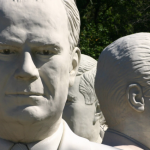John P. East
Against a modern age that denied notions of meaning, purpose, and truth, Richard Weaver articulated a conservatism of hope and affirmation based on the Platonic-Christian heritage and its manifestation in the American South.
Richard Weaver reasoned it was the emergence of nominalism, the departure from Platonism and Christianity, which produced the intellectual heresies leading to the trauma and anguish of the modern era. “It was,” he elaborated, “William of Occam who propounded the fateful doctrine of nominalism, which denies that universals have a real existence,” and as a result, “For four centuries every man has been not only his own priest but his own professor of ethics, and the consequence is an anarchy which threatens even that minimum consensus of value necessary to the political state.[63] Weaver concluded, “Whether we describe this as decay of religion or loss of interest in metaphysics, the result is the same; for both are centers with power to integrate, and, if they give way, there begins a dispersion which never ends until the culture lies in fragments.”[64]
Platonism and Christianity acknowledged there was “a center of things.” This center suggested transcendent ideals: truth, beauty, justice, and the good. Life had meaning and purpose, and the Platonic-Christian view allowed man to relate, to discern his position in the scheme of things; and it facilitated humaneness in the human condition, for man knew his nature and could he himself. But the spirit of modernity, rooted in nominalism, undercut that view. It rejected the notion that there was “a center of things,” and it turned in “flight toward the periphery.”[65] There was no longer an integrating ideal; the pull of intellectual forces was “centrifugal” rather than “centripetal.” Conceptually the life of the mind became “fragmented,” and the press to the “periphery” became a powerful “obsession.” There emerged a preoccupation with the factual and concrete—positivism manifested that trait. » Read More
https://theimaginativeconservative.org/2025/02/richard-weaver-conservatism-affirmation-hope-john-p-east.html






